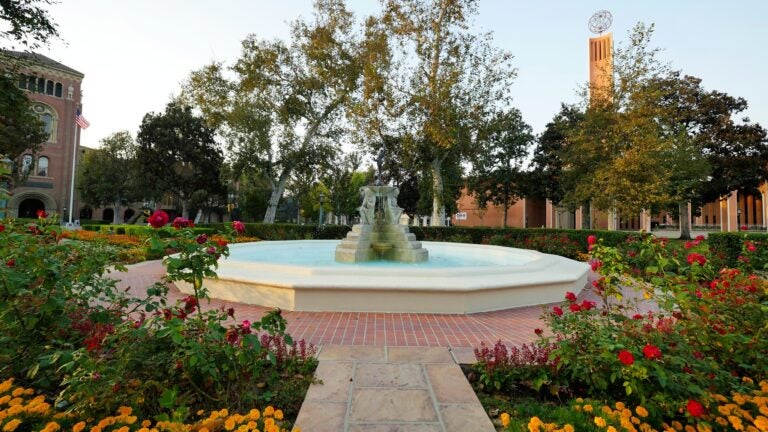One of the most exciting options available to undergraduates in USC’s Psychology program is the potential to take part in cutting-edge research projects. Because USC is a leading research institution, students have many routes for involvement in innovative studies. Your coursework will provide an important component of your education at USC but we invite all students to expand their horizons by taking part in research activities outside the structured context of the classroom. Undergraduate research can also provide experiences and skills that further your career goals, help prepare you for a graduate education, and assist in clarifying your interests and academic direction. Don’t miss out on this wonderful educational opportunity!
-
We encourage students to begin their experiences with research at an early stage in their education at USC. To this end, for PSYC major students, we suggest that students complete PSYC 100, PSYC 274, PSYC 314, and PSYC 316 as soon as possible. These courses serve as critical foundation for your development as a young scientist and are requirements for many of the research options available to you. Students will contact instructors using the research directory or other sources and are responsible for obtaining a placement. Once they find a placement, they fill out the contract and submit to academic advisor.
The proposal forms for PSYC 290x or PSYC 490x must be completed, submitted, reviewed, and approved by an undergraduate advisor before the student is given permission to register. The advisor will submit the proposal to the Chair for final approval. Students are responsible for registering for the class after the undergraduate advisor has given departmental permission (D-clearance).
-
PSYC 290x allows students to become involved in faculty-led research early in their studies. It is open to students in any major or year. The prerequisite is PSYC 100. The purpose is to develop specific research skills, knowledge in the area under investigation, and a clearer sense of long- term interests in research, academic programs, and career options. Students may enroll in 2 or 4 credits in one semester, continuing over multiple semesters, up to a maximum of 8 credits. Successive placements may be with the same or a different faculty advisor. Credits earned for 290x may be applied toward the lower division psychology elective requirement for majors or minors.
-
PSYC 490x allows students to conduct independent research under faculty direction. The prerequisites are PSYC 100, PSYC 274, and one additional psychology course. A minimum GPA of 3.0 is also required. Generally, a student will contribute to their PSYC 490x faculty mentor’s lab on a voluntary basis or while completing PSYC 290x before enrolling in PSYC 490x with that faculty member. Some students will design and conduct their own studies while enrolled in PSYC 490x. Others will work fairly independently on an ongoing research project in the lab, or prepare a significant literature review under the faculty member’s direction.
Students may enroll in 2 – 4 credits of PSYC 490x in one semester, continuing over multiple semesters, up to a maximum of 8 credits. Note that credits earned through completion of PSYC 490x may not be applied toward the 400-level course requirement for the psychology major. However, PSYC 490x may be applied toward the required, additional psychology course, either upper or lower division, of at least 2.67 units (max 4 units).
-
CGSC 490x allows students to conduct research under faculty direction. The course is open to juniors and seniors majoring in Cognitive Science. Students may enroll in 2 – 4 credits in one semester, continuing over multiple semesters, up to a maximum of 8 credits.
-
Learn more about the PSYC Honors program here, or contact Dr. Richard John, richardj@usc.edu who can provide more information about the program.
-
The cognitive science major with honors requires the student to complete the requirements for the major with a GPA of 3.5 or above and to complete in addition CGSC 498 Honors Thesis with a grade of B or better. Intent to complete the cognitive science major with honors should be registered with the undergraduate adviser no later than the second semester of the junior year.
-
These programs provide stipends and research training during the summer or academic year. The psychology department’s undergraduate advisors or the professor where you are volunteering as a research assistant can help you.
-
There’s more to being a researcher than just collecting and analyzing data. There are broader university-wide resources to help undergraduates develop into researchers such as fellowships, funding and symmposia.
-
- If you have specific interests in an area of psychology, you may use our website to identify faculty who might serve as appropriate mentors. The psychology site contains a page on research, listing research interests and professors in the department who specialize in certain areas, as well as a handy guide of undergraduate research assistant opportunities. You will also find that the Psychology faculty are flexible and open to exploring different avenues for partnerships with students.
Undergraduate Research Assistantship Directory (Fall 2025 – Spring 2026)
Your course instructors and the department advisors can also serve as valuable resources. Meet with your professors in their office hours, tell them about your interests, and they’ll help you to find potential mentors.
Do not hesitate to ask for information or reach out via email or visit office hours of faculty members or graduate students. You may need to contact several people in order to find a good match.
